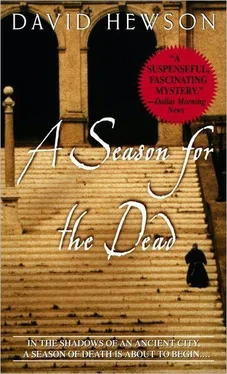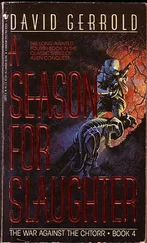David Hewson - A Season for the Dead
Здесь есть возможность читать онлайн «David Hewson - A Season for the Dead» весь текст электронной книги совершенно бесплатно (целиком полную версию без сокращений). В некоторых случаях можно слушать аудио, скачать через торрент в формате fb2 и присутствует краткое содержание. Жанр: Старинная литература, на английском языке. Описание произведения, (предисловие) а так же отзывы посетителей доступны на портале библиотеки ЛибКат.
- Название:A Season for the Dead
- Автор:
- Жанр:
- Год:неизвестен
- ISBN:нет данных
- Рейтинг книги:3 / 5. Голосов: 1
-
Избранное:Добавить в избранное
- Отзывы:
-
Ваша оценка:
- 60
- 1
- 2
- 3
- 4
- 5
A Season for the Dead: краткое содержание, описание и аннотация
Предлагаем к чтению аннотацию, описание, краткое содержание или предисловие (зависит от того, что написал сам автор книги «A Season for the Dead»). Если вы не нашли необходимую информацию о книге — напишите в комментариях, мы постараемся отыскать её.
A Season for the Dead — читать онлайн бесплатно полную книгу (весь текст) целиком
Ниже представлен текст книги, разбитый по страницам. Система сохранения места последней прочитанной страницы, позволяет с удобством читать онлайн бесплатно книгу «A Season for the Dead», без необходимости каждый раз заново искать на чём Вы остановились. Поставьте закладку, и сможете в любой момент перейти на страницу, на которой закончили чтение.
Интервал:
Закладка:
His companion said nothing, looking out at the downpour in the street.
Neither of them seemed much minded to remove the sunglasses, in spite of the weather.
“Where indeed?” Denney replied, patting the driver on the back again before opening the door and stepping out into the rain, holding the case out of sight as best he could, hiding it with his body. The two cops followed and immediately dashed under the paltry shelter of a nearby building.
Michael Denney stood motionless for a moment. The rain drenched his gray hair in seconds. He didn’t care. He was free in Rome for the first time in over a year. It made his head feel light. It was a delight beyond anything he could ever have expected. He looked around him. He was the only human being not trying to escape the torrent from the gloomy sky above. It would be so easy to walk away, to try to escape. But the two cops were young. They could soon retake him.
And, as they said, where would he go? He walked along the lane, in the center, not minding how wet he got. The cops dogged his footsteps from a distance, dashing from place to place to avoid the storm. Finally he reached the door to the church.
Denney closed his eyes, remembering her, trying, too, to remember himself all those years ago. A time when he understood a little of the word “love.” So much had been lost in the intervening years.
He threw the little case into the corner, satisfied they hadn’t seen it. “Ten minutes,” he yelled through the rain. “You’re sure you won’t join me?”
“Absolutely sure,” the one who’d been in the passenger seat bellowed back. The driver struggled with a cigarette. The flame of his lighter looked like a frail beacon trying to hold back the night.
Two successive claps of thunder burst over their heads. They pulled their jacket collars up and leaned hard into the wall, staring at nothing but the black stonework with water streaming down its face.
Michael Denney smiled at both of them, then stepped inside, picked up the case, turned left, away from the interior of the church, and walked into the small vestibule. It was, as he had hoped, empty, and just as he remembered it. Even the old sofa, where they’d made love so many times, was still there. He walked to it, touched the ancient, dry fabric, remembering the feel, the scent of her, all those years ago.
“I was a fool,” he said softly to himself. Even so, a small inner voice said, she was dying already. As they coupled with such ecstatic delight on the dusty sofa, the worm of sickness was beginning to turn somewhere inside her. Had they married, she would still be gone, leaving him with two children to raise, no career, and an exile from his own family.
It would have been worth it, Michael Denney thought. Just for those few short years. Even so, a part of him said that what had happened was for the best. In this place, his route of his life forked in two possible directions, and bitterness lay down both. At least there was a part of her still in his life now, though she was not undamaged, for which he was entirely to blame.
“I’m still a fool,” he said. He put the suitcase on a chair and opened it. Then he took off his jacket, removed the long priest’s surplice and pulled it over his head, letting the black gown fall down toward his ankles. He went into the case again, came out with the hair coloring and dabbed it carefully on his silver head, rubbing in the dark dye, running it through his locks with his fingers, wiping his hand with a cloth when the job was done. He looked at himself in the mirror. His hair had an unnatural sheen to it. Apart from that and a few extra lines, he could have been the priest he was more than thirty years before, ministering to the poor, deprived Irish areas of Boston. An anonymous man. One who hardly merited a second glance.
He smiled at this image of himself. Then he looked up at the boxes on the wall which had, as he hoped, not changed in three decades.
Methodically, working quickly, knowing there could be no delay, he began to turn off the lights in the church, one by one, leaving the switch covering the vestibule till last. Finally he threw that too and San Luigi dei Francesi fell into darkness. From beyond the door he heard noises: cries of surprise in the interior, fear perhaps, and a loud report, like a bulb bursting. Or perhaps a gun. A few people made for the door immediately. The storm had shut down the city by now, he guessed. There would be little light. Caravaggio would have recognized the scene.
When he walked out into the nave it was illuminated only by the spare, warm candlelight of the offerings in the chapels. Something was happening. There was fear in the darkness. Then it occurred to Denney he had forgotten one thing. The switch for the meters on the paintings was separate from the rest. He had left it turned on. Sure enough, there was a round, rich sea of light on one of the canvases: The Vocation of Matthew. It reflected on the image and threw back a waxy yellow tint onto the confused faces of the visitors who had gathered to admire the work.
Then the ancient mechanism of the light meter worked its way through the coin. The switch was thrown. Night consumed the belly of the church, partly rent only in places by the guttering flames of the votive candles.
Fifty-Eight
From somewhere came a scream. He began to move, praying she would remember his brief and precise instructions.
Gino Fosse had listened to Cannonball Adderley twice, all the while watching the people come in and out of the church. There were more than there should be. It wasn’t that much of a tourist attraction.
They had men there. Men pretending to look at the paintings on the walls, men pretending to pray. Michael Denney was nowhere to be seen.
Gino knew him so well. He could recognize that distinguished silver head anywhere. It lived in his imagination twenty-four hours a day.
He looked at his watch. It was ten minutes past midday. Torrential rain sounded like drumbeats on the roof. The light beyond the windows was now a dull, threatening gray. He let the music come to a stop and knew he couldn’t listen to one more note. With a muttered curse he tore the earphones off and stuffed them back into the pocket of the white tunic along with the CD. Then he thought about the act, almost laughed, took the things out and put them on the pew beside him. There was no more need for them.
He removed the gun from his waistband and held it under the cover of the bench ahead. The metal was soon hot and clammy in his grip.
“Mercy, Mercy, Mercy.” The melody ran through his head, sparking pictures in his mind: of Michael Denney dead. Of Sara, naked, staring mutely back at him as he thrashed over her, limbs spread-eagled in the shape of St. Andrew’s cross, one simple question in those sharp green eyes: Why?
“Because I thought you were like the rest,” he whispered, seeing her now, on the floor of the tower room in the Clivus Scauri, recalling the way she hardly fought, the shock in her expression. “I didn’t know.”
Not until Hanrahan whispered the truth in the darkness of San Lorenzo in Lucina, with the rats’ eyes glittering from behind the iron rack. From that point on, everything seemed a swirling, unreal dream.
He thought of his own end: a crouched, huddled figure, the white alb stained with red, the gun still pointed at his own temple. This was one final deliverance. He wasn’t waiting for them to get around to it.
“Where are you?” he murmured in a voice racked with tension.
The rain was bringing in too many people. They struggled through the door, most unaware of where they were, what they might see. The church was merely a refuge for them. He thought about that idea: It was what he’d always wanted it to be. He’d been cheated of that experience, by his father, by his own nature too.
Читать дальшеИнтервал:
Закладка:
Похожие книги на «A Season for the Dead»
Представляем Вашему вниманию похожие книги на «A Season for the Dead» списком для выбора. Мы отобрали схожую по названию и смыслу литературу в надежде предоставить читателям больше вариантов отыскать новые, интересные, ещё непрочитанные произведения.
Обсуждение, отзывы о книге «A Season for the Dead» и просто собственные мнения читателей. Оставьте ваши комментарии, напишите, что Вы думаете о произведении, его смысле или главных героях. Укажите что конкретно понравилось, а что нет, и почему Вы так считаете.












